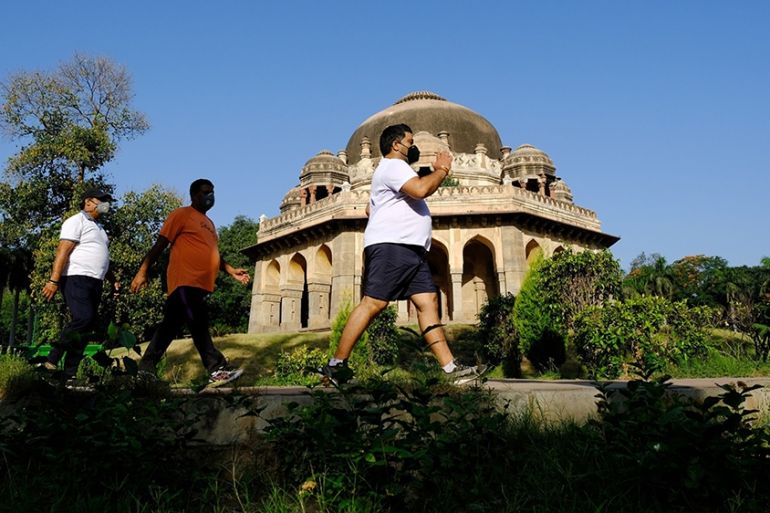India’s economy grew in Q1, but deep slump is expected
Though Q1 GDP topped estimates, coronavirus lockdowns have economists betting that negative growth is on the cards.

India’s economy grew at a faster pace than economists expected last quarter with a deeper slump likely to come after the nation of 1.3 billion people went into lockdown to contain the coronavirus outbreak.
Gross domestic product rose 3.1% in the three months through March compared with a year ago, the government said in a report Friday. That was higher than the 1.6% median estimate in a Bloomberg survey of economists and down from a revised 4.1% in the previous quarter. A separate report showed the fiscal deficit for the year through March 2020 reached 4.59% of GDP, breaching the government’s 3.8% target.
Keep reading
list of 4 itemsRussia’s Putin eyes greater support from China for Ukraine war effort
India-Iran port deal: A gateway to Central Asia or a geostrategic headache?
India’s income inequality widens, should wealth be redistributed?
Growth was 4.2% in the fiscal year through March 2020, the Statistics Ministry said, a performance that was in line with the median estimate in a Bloomberg survey. But it was slower than the 5% the government had expected before the virus outbreak.
The strict stay-at-home restrictions imposed late March brought India’s economy to a virtual halt, stranding millions of workers in cities without jobs and forcing millions more to flee to their rural homes. Economists are betting on contraction in GDP in the fiscal year through March 2021, which would be the first decline in more than four decades.
Manufacturing contracted 1.4% last quarter from a year ago, while construction plunged 2.2%. Financial services grew 2.4%, trade, hotels and transport gained 2.6% and agriculture climbed 5.9%. The government said the GDP estimates were “based on available data” and likely to undergo revision.
This “is barely a consolation”, said Kunal Kundu, an economist with Societe Generale GSC Pvt. “There is a higher probability that the impact of the week-long lockdown in March is not necessarily fully priced in, in the GDP data.”
The key services industries – contributing 55% of GDP and including businesses from call centers to software developers to hotels – took a severe knock during the lockdown and may show a deeper decline in the current quarter. India had the world’s worst services purchasing managers index in April, at 5.4, signaling a deep contraction at the start of the quarter.
Businesses like Infosys Ltd. and Tata Consultancy Services Ltd., which are part of India’s $181-billion IT services industry, are bracing for weak profits. Some global banks are scrutinizing their presence in India after the lockdown effectively closed call centers overnight. JPMorgan Chase & Co, Barclays Plc and Nomura Holdings Inc. are among lenders that initially scrambled to keep their Indian operations running.
The tourism industry is another one that’s taken a massive hit. Care Ratings Ltd. estimates 5 trillion rupees of revenue losses in the travel and hospitality industry this year and 35 million-40 million job cuts.
“The tourism industry will witness an unprecedented scale of job losses,” said Patanjali Govind Keswani, chairman and managing director of Lemon Tree Hotels Ltd. “Currently 60% of branded hotels in India are shuttered while the remaining 40% are operating with less than 10% of revenues.”
India has allowed businesses to begin reopening gradually since April 20, but a shortage of workers has made it difficult to resume operations fully. About 122 million people were out of jobs in April alone, according to estimates by the Center for Monitoring Indian Economy Pvt.
The government has unveiled a support package worth 21 trillion rupees ($277 billion) to help cushion the blow, including easing access to credit for small businesses and offering cheap loans to workers and farmers. However, with revenues already under pressure before the virus outbreak began, authorities have limited fiscal space to provide a more immediate boost.
(Updates with fiscal deficit data in second paragraph)
–With assistance from Manish Modi and P R Sanjai.